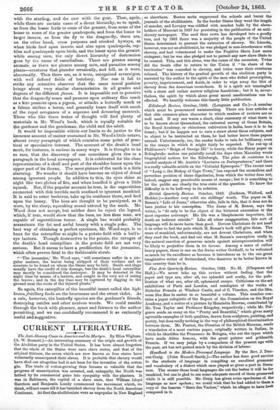CURRENT LITERATURE.
The Anti-Slavery Cause in America and its Martyrs. By Eliza Wigham. (A. W. Bennett.)—An interesting summary of the origin and growth of the Abolition party in the United States. It has been almost forgotten that the whole of the States were once slave states, and that of the original thirteen, the seven which are now known as free states have voluntarily emancipated their slaves. It is probable that slavery would have died out altogether had it not been for the invention of the cotton gin. The trade of cotton-growing then became so valuable that the progress of emancipation was arrested, and, unhappily, the North was bribed by its commercial gains into sympathy with the planters. It was in Baltimore, the capital of a slave state, that William Lloyd Garrison and Benjamin Lundy commenced the movement which, we think, will not cease till it has banished slavery from the North American Continent. At first the abolitionists were as unpopular in New England as elsewhere. Boston mobs suppressed the schools and burnt the journals of the abolitionists. In the border States they went the length of murder, and Lovejoy was riddled with musket balls by the slave- holders of Missouri in 1837 for persisting in the publication of an anti- slavery newspaper. The seed thus sown has developed into a goodly tree, and by 1861 there was a majority of the people of the United States determined to prevent the extension of slavery. Mr. Linooln, however, was not an abolitionist, he was pledged to non-interference with slavery, and had volunteered to make the Fugitive Slave Law more stringent; but he was also pledged not to permit any new slave State to be created. This, and this alone, was the cause of the secession. Twice did the South offer to return to the Union if " its share of the territories" was conceded to slavery, and twice were their overtures refused. The history of the gradual growth of the abolition party is narrated by the author in the spirit of the men who defied proscription, poverty, imprisonment, and death, in order to wipe away the blot of slavery from the American escutcheon. It is a spirit not unmingled with a stern and rather narrow religious fanaticism ; but it is, never- theless, the spirit by which alone great moral ameliorations can be effected. We heartily welcome this timely little publication.






























 Previous page
Previous page